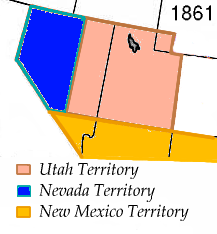The History of Nevada as a state began when it became the 36th state on October 31, 1864, after telegraphing the Constitution of Nevada to the Congress days before the November 8 presidential election (the largest and costliest transmission ever by telegraph). Statehood was rushed to help ensure three electoral votes for Abraham Lincoln's reelection and add to the Republican congressional majorities.[1]
Nevada's harsh but rich environment shaped its history and culture. Before 1858 small Mormon settlements existed along the border of Utah, with the western part stumbling along until the great silver strikes beginning in 1858 created boom towns and fabulous fortunes. After the beginning of the 20th century, profits declined while progressive reformers sought to curb capitalism. They imagined a civilized Nevada of universities, lofty idealism, and social reform. But an economic bust during the 1910s and disillusionment from failures at social reform and a population decline of nearly one-fourth meant that by 1920 Nevada had degenerated into a "beautiful desert of buried hopes."[2] The boom returned when big-time gambling arrived in 1931, and with good transportation (especially to California metropolitan areas), the nation's easiest divorce laws, and a speculative get-rich-quick spirit, Nevada had a boom-and-bust economy that was mostly boom until the worldwide financial crisis of 2008 revealed extravagant speculation in housing and casinos on an epic scale.[3][4]

- ^ Michael Green, "Abraham Lincoln, Nevada, and the Law of Unintended Consequences," Nevada Historical Society Quarterly, Summer 2009, Vol. 52#2 pp. 85–108
- ^ Wilbur S.. Shepperson, "Nevada: Beautiful Desert Of Buried Hopes," Nevada Historical Society Quarterly, Dec 1991, Vol. 34# 4, pp. 439–465
- ^ William D. Rowley, "People of Good Hope in the Land of Nod," Nevada Historical Society Quarterly, Mar 1999, Vol. 42#1 pp. 3–20
- ^ Louise L. Schiavone, "Vegas Revisited," Mortgage Banking Vol. 69#12 (September 2009) pp. 48+.
- ^ Gannett, Henry (1855). Boundaries of the United States. Washington, Govt. Print. Off.
